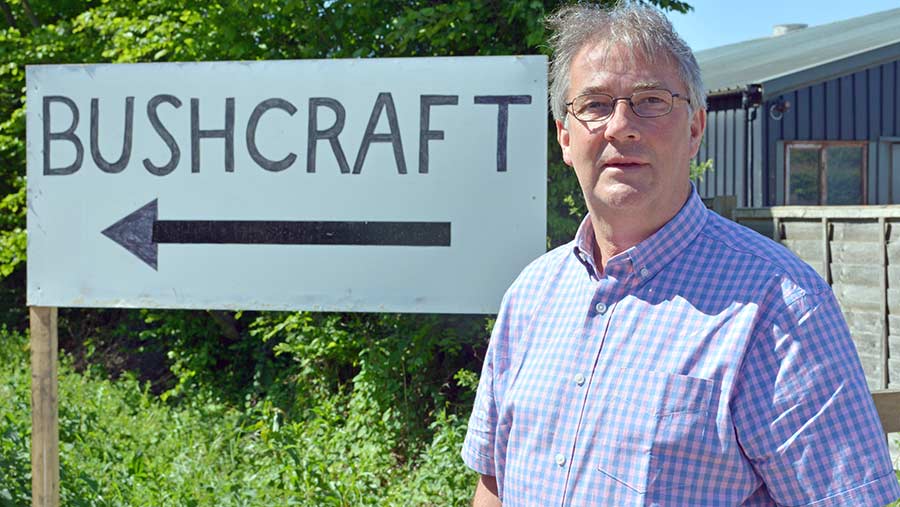Farmer’s relief as three-year campsite battle nears end
 William Ashley
William Ashley A Hertfordshire farmer at loggerheads with his local council after an outdoor pursuit company set up camp in adjacent woodland hopes his three-year battle may soon be over after the local authority admitted it made a mistake.
William Ashley, who farms at Monks Green Farm, near Hertford, said his ordeal began after the Bushcraft Company erected 56 tents on land next door.
The company uses the woodland to host residential camping trips for students and schoolchildren aged seven to 18.
See also: Five tips to speed up planning permission
Mr Ashley said coach drivers often get lost trying to find the campsite and end up travelling down his farm drive.
On other occasions, parents and taxi drivers coming to collect children from the site knock on his door ask for directions. Verges were damaged as the increased traffic took its toll on local lanes.
Land used for tented camping for more than 28 days a year usually requires planning permission – or an exemption.
Mr Ashley said he was convinced Bushcraft had neither – but it took three years before East Hertfordshire District Council acknowledged they needed one or the other.
Nightmare
“What Bushcraft do with the kids is fantastic,” said Mr Ashley, who erected a signpost in an effort to point coach drivers in the right direction and away from his farm. “But coaches were rocking up the drive and then having to back out again because they couldn’t turn around – it was a nightmare.”
Section 269 of the 1936 Public Health Act requires an operator to obtain a special licence from the local authority for land used as a campsite for more than 42 days in a row – or 60 days in total during any 12-month period.
The Bushcraft Company told Farmers Weekly it had worked closely with the local authorities to obtain all necessary licences to operate at the site. These included a Section 296 licence and planning permission to erect a storage compound, it added.
Signage
In a statement, Bushcraft said: “The company has signage located at the entrance to the site and provides all schools with detailed instructions of where coaches need to drop off and collect school groups at the start and end of their camps.”
After being contacted by Farmers Weekly, a spokesperson for East Hertfordshire Council said the local authority had now advised Bushcraft it would either require full planning permission for the site or a certificate of exemption from Natural England.
“The council has written to the company giving them 28 days to apply for either of these,” said the council spokesperson. “The company already has a licence under the Public Health Act 1936 – although such licences only cover how campsites are run.”
Tricky situation can be expensive to resolve
Situations like this can be incredibly frustrating and leave farmers feeling powerless, says Julie Robinson, partner at Roythornes Solicitors.
“Private actions are available, but cost and the chances of success are major obstacles except in the most indefensible cases,” she explains.
In cases of simple trespass, farmers can take action, but it is probably not worth pursuing except where there is continuous or repeated trespass creating significant risk.
“You are best asking people politely to leave and putting up more private land notices. If people come on to your land with the intention of disrupting your lawful activities, that’s a different matter; such aggravated trespass is a criminal offence.”
A private nuisance claim may also be possible, but again this is best saved for situations where there is continuous and unreasonable interference with the use or enjoyment of your land.
Indirect options rely on hard-pressed local authorities and others to take action. You might act if planning regulations are being breached, or if roadways are being used in a way that exceeds their status, such as a bridleway being used by vehicles.
You may also ask whether conditions of any licence or exemption under the Public Health Act 1936 are being observed, or whether the use of the land is exceeding its permitted use, for example under a tenancy, licence or restrictive covenant.
There might be grounds for a statutory nuisance action by the local authority, but the bar is set high.
Consider whether an activity is unreasonably and substantially interfering with the use of your land or likely to injure health. This could include letting rubbish pile up or unreasonable noise.
